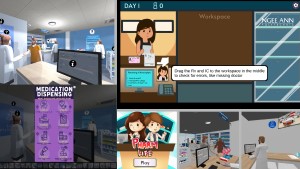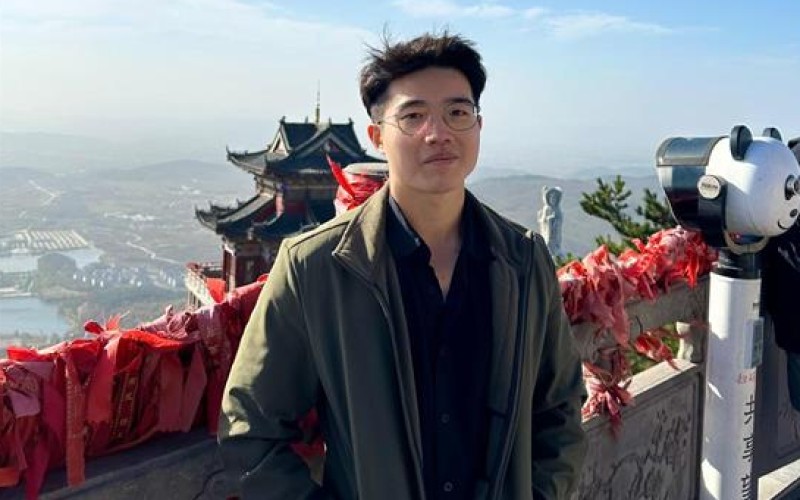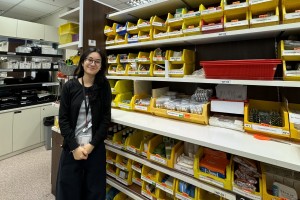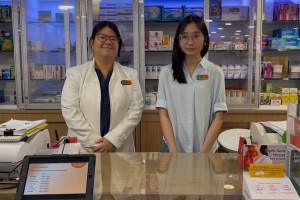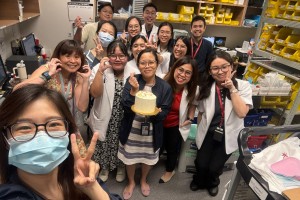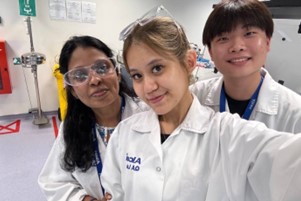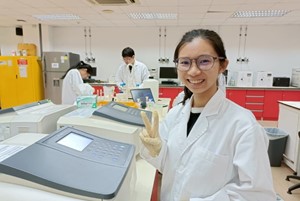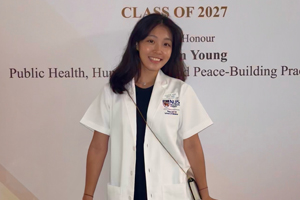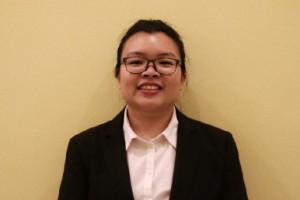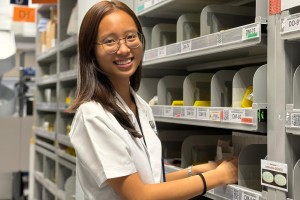Why PHARM?
- Unique curriculum integrates clinical pharmacy and pharmaceutical science applications to give you an edge in future careers and degrees in medicine, pharmacy, dentistry, life sciences and allied healthcare
- Explore new possibilities in drug and treatment development with two elective options: Complementary Medicine & Traditional Chinese Medicine or Nutrition & Dietetic Science
- Gain future-ready skills in healthcare innovations to transform pharmaceutical practices and operations through internships and capstone projects
- Apply for Pharmacy Technician Sponsorships offered by various healthcare institutions
About PHARM
Discover the exciting world of clinical pharmacy and drug discovery & development with the Diploma in Pharmaceutical Science (PHARM). With Singapore’s status as a leading hub for healthcare and pharmaceutical manufacturing & research, explore bright career prospects in these cutting-edge fields!
Build a solid foundation in biological, chemical and pharmaceutical sciences. Dive into topics such as:
- Human anatomy & physiology
- Human diseases & treatments
- Clinical skills in pharmacy practice
- Drug discovery & design
- Biotechnological applications in pharmaceutical science
In addition, you will learn essential lab techniques for formulating and analysing pharmaceutical products, as well as best practices in the industry.
PHARM equips you with the skills to stay current with emerging trends in clinical pharmacy, pharmaceuticals and life sciences.
Learn essential pharmacy practices for better patient care like good dispensing skills, plus innovations such as health informatics for clinical decision support, workflow automation, personalised medicine and the growing applications
of AI in pharmacy practice.
You will also explore key technologies in biologics development, including molecular biology and proteomics techniques. Through formulation science and bioanalytical methods, you will understand how to ensure pharmaceutical products are
safe, stable and effective. These learnings give you a solid grasp of the methods and processes involved in producing biologics and pharmaceutical products.
With a strong foundation in technology and pharmacy practice, you will be well-positioned for careers in healthcare (especially pharmacy), and the pharmaceutical and biopharmaceutical industries.
Learn on-site at community and hospital pharmacies such as NHG Health Pharmacy and Singapore General Hospital, or with global pharmaceutical companies like Lonza and Alcon. Over six months, apply your knowledge in real-world settings and develop valuable professional experience and networks!
You can take electives to enhance your skills and career prospects. Choose Complementary Medicine & Traditional Chinese Medicine to evaluate alternative therapies and traditional Chinese medicines, or Nutrition & Dietetic Science to explore the impact of nutrients, supplements, and weight management on health.
Overview of Your PHARM Journey
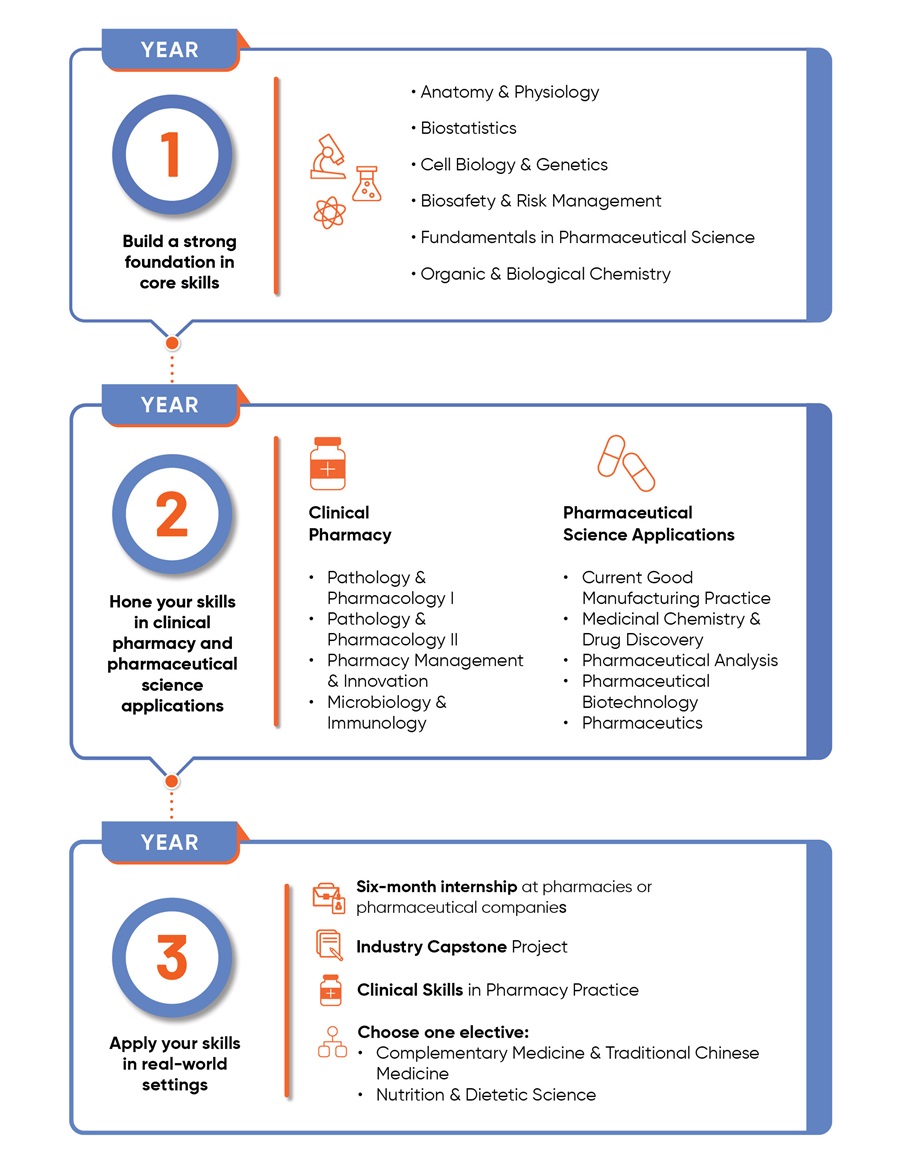
Highlights
From PHARM to Top Uni Courses
Some of our pharmacy graduates have gone on to pursue degrees in Medicine and Pharmacy at top universities – thanks to the strong foundation built here.
Impactful Internships
Further Studies
As a PHARM graduate, you can apply for the Bachelor of Pharmacy (Honours) and Bachelor of Science (Pharmaceutical Science) at National University of Singapore (NUS), as well as other professional degrees such as Medicine & Dentistry.
Besides, you can venture into the fields of life sciences, biological science and allied health (such as dietetics & nutrition, physiotherapy, occupational therapy, and diagnostic radiography) at NUS, Nanyang Technological University and Singapore Institute of Technology.
You can also pursue other degrees in areas like the arts, architecture, business, education, psychology, and social sciences offered by local universities.
You may enjoy exemption when applying for related degree programmes at overseas universities, including:
Australia
- Monash University
- Queensland University of Technology
- RMIT University
- The University of Melbourne
- The University of Queensland
- The University of Sydney
- The University of Western Australia
New Zealand
- The University of Auckland
- University of Otago
Industry Partners

Careers
Your PHARM diploma will open doors to many careers, including:
- Pharmacy Technician
- Laboratory/Research Technologist
- Quality Assurance/Control Analyst
- Clinical Trial Associate/Coordinator
- Healthcare Product Executive
- Pharmacy Sales Executive
- Regulatory Executive
Entry Requirements
AGGREGATE TYPE ELR2B2-C
To be eligible for consideration, candidates must have the following GCE ‘O’ Level examination (or equivalent) results.
| Subject | 'O' Level Grade |
|---|---|
| English Language | 1-7 |
| Additional Mathematic /Mathematics | 1-6 |
| Any one of the following subjects: Biology Biotechnology Chemistry Food & Nutrition / Nutrition & Food Science Physics Science (Chemistry, Biology) Science (Physics, Biology) Science (Physics, Chemistry) | 1-6 |
Applicants must also fulfil the aggregate computation requirements for the ELR2B2-C Aggregate Type ( English Language, 2 relevant subjects and 2 other best subjects) listed at www.np.edu.sg/docs/ELR2B2.pdf .
For students with other qualifications, please refer to the NP website for the entry requirements and admissions exercise period.
Candidates with colour vision deficiency may encounter difficulties meeting the course requirements and expectations.
What You Will Learn
Mathematics (3 Credit Units)
This module provides students with a fundamental analytical knowledge of mathematics essential for the study of life sciences. The module is designed to equip students with the necessary mathematical techniques to solve biological and chemical problems, as well as to carry out analytical studies in their future work. Topics include exponential and logarithmic functions, integration, differentiation and differential equations.
Cell Biology & Genetics (4 Credit Units)
This module exposes students to key themes and experimental techniques in eukaryotic cell biology and genetics. It covers cell structure and function of cellular organelles, regulations of cell cycle and cell division, study of genes, genetic variation and heredity. Fundamentals of molecular biology such as the structure of DNA, DNA replication, transcription and protein synthesis will also be outlined.
Biosafety & Risk Management (4 Credit Units)
This module aims to equip students with essential knowledge and skills for safe handling of chemicals and biological agents as well as fundamentals of decontamination and waste management. Topics such as follow biosafety and biosecurity principles and practices, risk assessment and mitigation, national and international biosafety guidelines and legislation, and emergency response programme will also be covered. Students will be issued Workplace Safety & Health (WSHC) recognized bizSAFE Level 2 certificates upon completion of this module.
Inorganic & Physical Chemistry (4 Credit Units)
The module covers the structure of matter, chemical bonding, thermochemistry, chemical equilibria, kinetics, electrochemistry and redox reactions, transition metal chemistry, and chemistry of solutions, including acids, bases and buffers, polarity and solubility.
Career & Professional Preparation I (1 Credit Units)
This module is part of the Education and Career Guidance framework to provide students with the tools and resources necessary for their career and/ or further education. Students will undergo personal discovery and exploration of industry and career prospects. Students will learn how to plan and set achievable goals in preparation for their future. Students will also learn the importance of passion and professionalism, along with basic teamwork and interpersonal skills.
English Language Express* (Credit Units - NA)
English Language Express aims to give you a better grounding in the English Language and to strengthen the written and oral communications skills that you will need in your academic and professional careers. You will be engaged in writing, reading, listening and speaking activities that will develop your ability to speak and write grammatically, coherently and clearly. You will also hone your reading and listening comprehension skills.
Anatomy & Physiology (3 Credit Units)
This module introduces the anatomy and functions of the human body. It equips students with an understanding of the anatomy and physiology of the cardiovascular, respiratory, renal, gastrointestinal, neuromuscular, skeletal, endocrine and reproductive systems.
Fundamentals in Pharmaceutical Science (4 Credit Units)
This module introduces students to pharmaceuticals and the roles, responsibilities, job scopes and future of pharmacists and pharmacy technicians. The module provides a foundation for subsequent modules in the course. Introductory topic in pharmacology,
pharmaceutical science, pharmacy laws and pharmaceutics will be covered. Students will also learn how to perform pharmaceutical calculations to determine dosage.
Organic & Biological Chemistry (4 Credit Units)
In this module, students are introduced to the chemistry of hydrocarbons, alcohols, amines, aldehydes, ketones, carboxylic acids and their derivatives. The structures, functions
and chemical reactions of biological molecules, including carbohydrates, lipids and proteins and their derivatives are also covered.
Biostatistics (3 Credit Units)
This module is designed to provide students with basic statistical skills to analyse and interpret simple biological, pre- clinical and clinical data. The basic statistical skills covered are
descriptive statistics, data distribution, set sample size, measurement of central tendency, scatter diagram, cluster analysis, and simple linear correlation and regression analysis for linear data. Students will learn about the presentation of data
in graphical forms using Microsoft Excel, including selection and preparation of different types of graphs, how to write titles and legends, and interpretation of results and draw conclusions.
Confident Communication: Find Your Voice (VOICE)^ (3 Credit Unit)
The VOICE module aims to empower students to become thoughtful and confident communicators able to tailor a message to suit audience, purpose and context. Students will learn how to use storytelling structures and techniques, persuasive strategies and effective visuals to connect meaningfully with their audience. Through a personalised growth plan, the module encourages students to reflect, set goals and take ownership of their growth and development as communicators. The module employs engaging teaching strategies such as games, thinking routines, masterclasses and workshops, and a celebratory showcase festival at the end to make learning fun and exciting.
Health & Wellness^ (1 Credit Unit)
Current Good Manufacturing Practice (2 Credit Units)
This module aims to equip students with an understanding of current Good Manufacturing Practice regulations for pharmaceuticals and related products. Various aspects, such as attributes of materials, labelling, materials in process, finished pharmaceuticals,
manufacturing validation, quality control, personnel and facilities are covered.
Pathology & Pharmacology I (4 Credit Units)
This module focuses on the causes and mechanisms of various systemic diseases coupled with mechanism of drug actions, dose response relation, adverse reaction and pharmacokinetics. The pathophysiology of diseases, implications for treatment and prevention
will be discussed.
Pharmaceutical Biotechnology (4 Credit Units)
This module builds upon knowledge covered in foundation modules and encompass molecular biology, protein & cell technology and bioprocesses. Students will gain understanding on molecular methods and biochemical techniques employed in pharmaceutical
and biopharmaceutical applications.
Applied Biostatistics (3 Credit Units)
This module covers advanced statistical skills to analyse and interpret a wide range of biological, pre-clinical and clinical data, and preparation of data for scientific presentation. The scientific presentation section covers how to organise data, prepare
and incorporate statistical results on graphs and interpretation of results.
Pharmaceutics (5 Credit Units)
This module focuses on the design and formulation of two-phase pharmaceutical products, including suspensions, emulsions and solid pharmaceutical products, and how they relate to absorption and drug delivery routes. Students will gain understanding in drug formulations, preparation and dispensing of pharmaceutical and drug stability of various formulations and shelf life.
World Issues: A Singapore Perspective^ (2 Credit Units)Medicinal Chemistry & Drug Discovery (4 Credit Units)
The first part of this module highlights the drug discovery process and how compounds are identified and developed into drugs. The second part of the module introduces students to the chemistry of drugs and drug systems. They will also learn about the
relationship between activity and functional group chemistry, and drug design.
Pharmaceutical Analysis (4 Credit Units)
This module studies modern analytical techniques that are used for the detection, identification and quantitative determination of drugs and related substances. Techniques for the evaluation of analytical data and validation of analytical methods will
be discussed.
Microbiology & Immunology (4 Credit Units)
This module covers fundamental knowledge regarding the role of microbial pathogenesis and the role of immune cells in protective immunity against bacterial, viral, fungal and parasitic infections. Students will gain an understanding in medical microbiology,
microbial pathogenesis and immunological concepts for the understanding of drugs that target components of the immune system.
Pathology & Pharmacology II (4 Credit Units)
This module focuses on the causes and mechanisms of various systemic diseases coupled with mechanism of drug actions, dose response relation, adverse reaction and pharmacokinetics. The pathophysiology of diseases, implications for treatment and prevention
will be discussed.
Career & Professional Preparation 2 (2 Credit Units)
This module is part of the Education and Career Guidance framework to provide students with the tools and resources necessary for their further career and/or education. In this module, students will explore basic job search strategies, practise writing
effective resumes and cover letters, and learn interview skills. Students will also learn professional and intercultural communication skills to prepare them for a dynamic and diverse workplace.
Pharmacy Management & Innovation (3 Credit Units)
This module focuses on the essential aspects involved in operating both hospital and retail pharmacies. Students will develop a comprehensive understanding of the Singapore healthcare landscape, supply-chain management, and automation systems that support efficient pharmacy operations.
The module also introduces emerging trends and innovations shaping modern pharmacy practice, including digital health technologies, tele-pharmacy, robotics, personalised medicine, and domains related to AI that enhance that enhance patient care and workflow efficiency.
Clinical Skills in Pharmacy Practice (8 Credit Units)
In this module, students will study the therapeutic effects of drugs, their mechanisms of action, common doses for disease states, and the concept of rational drug selection coupled with patient care, pharmacy law and professional ethics. This will be simultaneously integrated with the fundamentals of good dispensing practices and counselling. The application of clinical data in interpreting results and the optimization of drug therapy in a clinical setting will also be covered.
Capstone Project (8 Credit Units)
This module will expose students to real work environment and providing them opportunities to apply their knowledge and skills learned to industry-related projects at the workplace.
Electives (Choose any 1) (2 Credit Units)
Complementary Medicine & Traditional Chinese Medicine
This module describes how philosophies of alternative medicines and therapies are used to complement those of conventional medicine. The mechanism of action, dosage forms and pharmacological aspects of selected complementary medicines and traditional Chinese medicines will be covered, including the responsibilities associated with the sale and marketing of complementary medicines.
Nutrition & Dietetic Science
This module provides students with a basic understanding of nutritional and dietetic concepts, including the role of micro and macronutrients in the diet and their effects on health. Principles of clinical nutrition and dietary requirements for special medical conditions and at different life stages will also be covered. Students will also learn to evaluate the evidence behind the use of common nutraceuticals and functional foods for health benefits as well as the regulations associated with the sales and marketing of such therapies.
Project ID: Connecting the Dots^ (4 Credit Units)
6-Month Internship (Local) (20 Credit Units)
The six-month internship provides students with exposure to the real work environment, providing opportunities to relate and apply the knowledge acquired during the course to work situations and enable the transition into the workplace. Clear learning outcomes, close mentorship, meaningful and real work activities allow for structured learning throughout the duration of the internship. Students will be attached to companies in various healthcare and pharmaceutical industries. Students will also have the opportunity for overseas internships.

